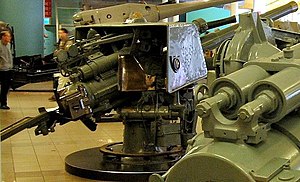QF 4 inch Mk IV naval gun
| Ordnance QF 4 inch gun Mk IV, XII, XXII | |
|---|---|

Mk IV gun from HMS Lance at the Imperial War Museum, London
|
|
| Type | Light Naval gun Submarine gun |
| Place of origin | United Kingdom |
| Service history | |
| In service | 1911-1940s |
| Used by | United Kingdom |
| Wars |
World War I World War II |
| Production history | |
| No. built | 1,141 |
| Specifications | |
| Weight | 2,750 pounds (1,250 kg) barrel & breech |
| Barrel length | 160 inches (4.064 m) bore (40 calibres) |
|
|
|
| Shell | Mk IV : Separate QF 31 pounds (14.06 kg); Mk XII & XXII : Fixed QF 31 pounds (14.06 kg), 35 pounds (15.88 kg) from 1944 |
| Calibre | 4-inch (101.6 mm) |
| Breech | horizontal sliding block |
| Elevation | PIX Mount -10° to +20° CPIII Mount -10° to +30° |
| Muzzle velocity | Mk IV : 2,370 feet per second (720 m/s) Mk XII & XXII : 1,873 feet per second (571 m/s) |
| Maximum firing range | 11,580 yards (10,590 m) at +30° |
The QF 4-inch gun Mk IV was the main gun on most Royal Navy and British Empire destroyers in World War I. It was introduced in 1911 as a faster-loading light gun successor to the BL 4 inch Mk VIII gun. Of the 1,141 produced, 939 were still available in 1939. Mk XII and Mk XXII variants armed many British interwar and World War II submarines.
Mk IV armed many British destroyers and some cruisers in World War I. It was used to arm merchant ships in World War II.
The guns armed the following warships :
The Mk XII variant was developed for arming submarines from 1918, Mk XXII was developed to arm submarines during World War II. These submarine guns fired a heavier 35 pounds (16 kg) projectile from late 1944. Shortly after the end of hostilities, the Mk XXII was superseded in new British submarines by the lighter QF 4 inch Mk XXIII.
...
Wikipedia
